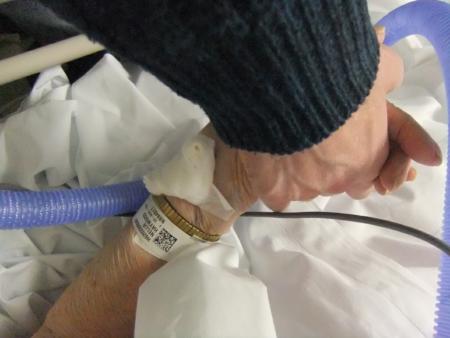Looking at caregiving
"O Mary, Seat of Wisdom, intercede as our Mother for all the sick and for those who care for them!"
Pope Francis offers that prayer near the end of his message for this year's World Day of the Sick, to be marked Feb. 11, the feast of Our Lady of Lourdes.
And, he continues, "grant that, through our service of our suffering neighbors, and through the experience of suffering itself, we may receive and cultivate true wisdom of heart!"
Caregivers and care-receivers -- through those distinct and often difficult vocations to which God calls them -- have the opportunity to grow in wisdom and grace. But it isn't easy.
You know that if you are a caregiver. Or a care-receiver.
What you might not know as a caregiver is why, at times, it seems your care-receiver, your loved one, is making it hard for you to provide that care.
As a social worker, my late wife Monica frequently came across that situation. The family member -- the spouse, the adult child -- just couldn't understand why his or her loved one was digging in those heels and refusing to ... whatever it was.
Later, when we began the Friends of St. John the Caregiver, she would give talks about looking at "caregiving from the care-receiver's point of view."
When conflict arises, what can you do? As you make your decisions, it's helpful if you keep in mind these guidelines:
1) Encourage and allow independence.
A part of growing to adulthood is accepting, and sometimes demanding, independence. An illness or mental deterioration can mean the chipping away of that personal freedom. A goal for you as a caregiver is to delay or to minimize that erosion. Your role is to offer assistance that helps your loved one remain as independent as possible.
2) Whenever possible, let your care-receiver be in control.
It's human nature that we want to be in the driver's seat when it comes to our own lives. Giving up control, or having it snatched from us, can make us angry and frightened.
3) Remember, each of us has a God-given right to self-determination.
We were created to make choices. We were given free will. This means that in day-to-day living, your loved one has the right to determine what his or her life will look like. To do this or to do that.
That's fine in theory, but complicating the issue in the real world of caregivers and care-receivers is the fact that, sadly, at some point your loved one's ability to make safe decisions may begin to fail. He or she may begin to choose what is dangerous or unhealthy or may lapse into self-neglect.
That's not a valid excuse for you to decide on your own that your loved one is incompetent and to take over all decision-making for him or her. It's better for you, and your care-receiver, to ask for a professional geriatric assessment, to help objectively evaluate the situation.
BILL DODDS IS A COLUMNIST WITH THE CATHOLIC NEWS SERVICE.
- Bill Dodds is a columnist with the Catholic News Service.



















